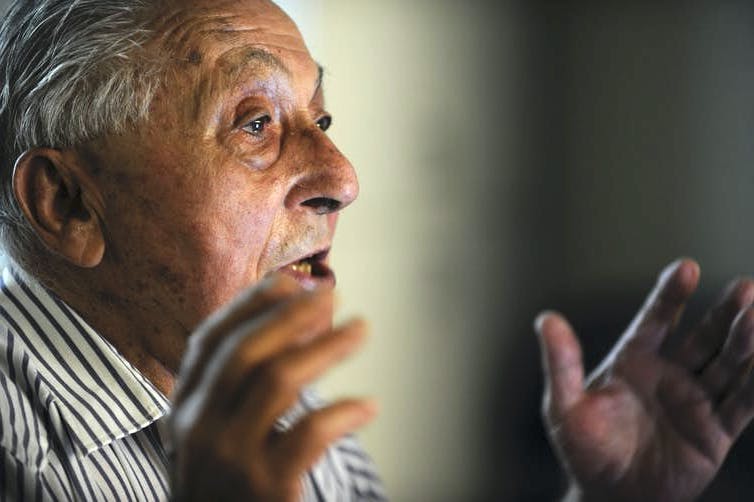Kristina M. Lee pays tribute to a Holocaust survivor’s contribution to the fight for religious freedom after his Covid-related death earlier this year.

Walter Plywaski fought for atheists to be given citizenship rights.
(Helen H. Richardson/The Denver Post via Getty Images)
By Kristina M. Lee
Colorado State University
 Walter Plywaski’s death earlier this year from complications related to COVID-19 went largely unnoticed by national media.
Walter Plywaski’s death earlier this year from complications related to COVID-19 went largely unnoticed by national media.
Only an invitation by his family to donate to the civil liberties group ACLU in Plywaski’s memory gave hint to his legacy in the fight for religious freedom. Almost 70 years ago, Plywaski fought for the right of atheists to become U.S. citizens – and won.
As a scholar of religious and political rhetoric, I believe that Plywaski’s fight is worth remembering. Stories like Plywaski’s give an insight into the discrimination atheists in the U.S. face even today and the role that those professing no faith have had in holding society accountable to the goals of religious tolerance and freedom.
‘Seeking Admission on Your Own Terms’
Polish native Walter Plywaski, born Wladyslaw Plywacki, spent five years in Nazi concentration camps during the Second World War. After being liberated from Dachau, the Bavarian camp in which 41,500 prisoners died, he worked as an interpreter before immigrating to the U.S and serving four years in the U.S. Air Force.
Please Support Our Summer Fund Drive!
In August 1952, Plywaski petitioned for U.S. citizenship while in Hawaii. All he had left to do was say his oath of allegiance.
Plywaski, however, was an atheist. He informed the judge that he could not sincerely end the oath with the words “so help me God” and requested an alternative.
Judge J. Frank McLaughlin reportedly asked Plywaski to consider what it says on the back of U.S. coins: “In God We Trust.” McLaughlin then denied Plywaski citizenship, justifying his decision by proclaiming, “Our government is founded on a belief in God,” and accused Plywaski of “seeking admission on your own terms.”
With the help of the ACLU, Plywaski appealed McLaughlin’s decision, arguing it was a violation of religious freedom while noting that natural-born citizens had the option to say affirmations rather than oaths, which allowed them to affirm their allegiance based on their own honor rather than a belief in a higher power.
McLaughlin, however, stood his ground. He argued that the case was not about religious freedom but about whether Plywaski “believes in all the principles which support free government,” which according to McLaughlin included a belief in God.
Plywaski moved to Oregon and successfully petitioned to have his case moved there to be looked at by a different judge. In January 1955, Plywaski won his case and became a citizen.
Plywaski’s case confirmed that those applying for citizenship must have the option to not recite “so help me God” when taking their oath, a policy that is now explicit in the U.S. Citizenship and Immigration Services policy manual.
Anti-Atheist Discrimination
But despite the precedent he set, Plywaski was not the last atheist who would be denied U.S. citizenship – more than 60 years later, nonreligious people still had to fight for immigration rights. In 2013 and 2014, two women were initially denied citizenship after being told they had to be religious in order to be conscientious objectors when refraining from stating in their oaths that they will “bear arms on behalf of the United States when required by law.”
This was despite 1965 and 1970 court cases that affirmed that atheists could be conscientious objectors.
And even atheists with citizenship have been denied certain rights because of requirements that a religious oath be uttered.
Roy Torcaso won a 1961 U.S. Supreme Court case after he was denied a position as a public notary when he refused to recite an oath acknowledging the existence of God. Torcaso’s case made clauses in state constitutions banning atheists from holding public office unconstitutional and unenforceable. Yet such bans have still occasionally been used to challenge open atheists who have won public office, though such challenges have failed.
And in 2014, an atheist in the Air Force was denied reenlistment after refusing to say “so help me God” in his oath. The Air Force later reversed the decision and updated its policy after atheist groups threatened to sue.
Such instances fit a pattern of discrimination against atheists. A 2012 study found that that nearly 50 percent of atheists have felt forced to swear a religious oath. While they legally should have options to say alternatives, the pressure to take the religious oaths remains.
Because “so help me God” is the default in many oaths, atheists often have to decide between passing as theistic or outing themselves as atheists – which, in a country where good citizenship is often unfairly tied to a belief in God, could potentially bring stigma onto themselves or mean risking being denied certain rights.
Atheists tend to win cases in which they challenge the denial of their citizenship and other rights based on their refusal to acknowledge God. Yet the fact that atheists risk facing additional obstacles and legal fights to have their citizenship recognized speaks, I believe, to their continued marginalization.
The Atheist Fight for Religious Tolerance
The atheist fight for equal rights is rarely acknowledged outside of active atheist communities. My research shows how the discrimination against atheists fits with what I describe as a deeply ingrained and coercive theist, normative mindset that frames democratic societies and good citizenship as being tied to belief in a higher power.
Historians such as Leigh Eric Schmidt, David Sehat, Isaac Kramnick and Robert Laurence Moore have written about religious oppression in the United States and its impact on atheists. These histories highlight how stigma surrounding both atheism and openly critiquing religion and religious oppression often pressured atheists to hide their identity.
Yet, there were – and still are – atheists, like Walter Plywaski, willing to openly challenge discrimination. Their stories are part of the larger fight for religious tolerance within the United States.![]()
Kristina M. Lee is a Ph.D. candidate in rhetoric at Colorado State University.
This article is republished from The Conversation under a Creative Commons license. Read the original article.
The views expressed are solely those of the author and may or may not reflect those of Consortium News.
Please Support Our
Summer Fund Drive!


La liberté religieuse est une notion tronquée, trafiquée et trompeuse. Ce n’est pas de liberté religieuse qu’il faut parler, discuter, mais plutôt de liberté de conscience.
Ce qui doit être respecté, en tenant compte de la liberté de croyance, ce sont les associations de croyants ou pas. Évidemment, celles-ci doivent respecter la loi commune à tous: c’est la primauté de la CHOSE PUBLIQUE sur la CHOSE PRIVÉE. Il faut savoir discerner.
U.S. Church Membership Falls Below Majority for First Time
WASHINGTON, D.C. — Americans’ membership in houses of worship continued to decline last year, dropping below 50% for the first time in Gallup’s eight-decade trend. In 2020, 47% of Americans said they belonged to a church, synagogue or mosque, down from 50% in 2018 and 70% in 1999.
Balance of article available at Gallup website
I am surprised that in this day and age there is still such an attachment to superstitious nonsense….I suspect that the superstitious are lying about their convictions….Otherwise they wouldn’t feel threatened by those who don’t share their beliefs.
Fortunately we now have organizations like the Freedom From Religion Foundation to help in those fights. Take heart, we’re winning!
“Religion has been used to justify countless horrendous crimes, ..”, now R2P may be used, human creativity has no bounds while the power of ethics remains limited.
Thank you for posting this story. I am a lifelong atheist but had never heard of Walter Plywaski, to my shame. In the 21st century, there is no reason to continue to support religious superstition. I personally refuse to swear by a deity and always affirm. It is past time for the human race to give up their childlike belief in an all-powerful supernatural being that, like a parent, controls rewards and punishments. Religion has been used to justify countless horrendous crimes, the supposed “divine right” of kings to control whole populations, and war, usually accompanied by the motto “Gott mit uns”, “God on our side” and other insanity. Primitive humans did not know where the sun went when it set, did not know the reasons for natural disasters, did not know anything about disease–in other words, did not know about the world they inhabited. It took thousands of years for science to develop along with the rational human brain. Clinging to primitivism has not advanced the human race one iota.
Great comment! Even those beloved totems of implied religiosity, the founding fathers, were mostly Deists who believed that God excused Himself to go to the bathroom and never returned. In His eternal absence, we’ve been given the chance to become more human than God-like, thereby making up for the always misplaced, and therefore unnecessary power of unquestioned authority.
Very eloquently said, Ms. Zaremba. I’m with you.
Oo-oo What you said. I have not been a lifelong atheist but I long ago figured out that being religious proved nothing.
Consider, Carolyn, the consternation that would result were it suggested that the motto on our coinage ought be changed from, “In God We Trust”, to “It’s Up To Us”.
Why, in the U$, one cannot even run for most political offices unless it is “understood” that one not only “believes”, but also talks to the Sky Daddy about things like going to war, as George W. most famously did, getting approval before launching his GWOT (Global War On Terror).
Personally, I have always wondered if Sky Daddy’s voice might have been very similar to that of Dick Cheney.
Doubtless, such information is Top Secret and hidden under National Security rules.
Mark Twain’s “War Prayer” always comes to mind for me when the U$ flexs its war muscles.
I wonder if Sky Daddy has ever read such things, however much it’s sentiments might be beneath Him.
Understand, I hold that people can believe whatever they want to.
However, no belief should ever be a litmus test for becoming a citizen or holding public office.
That is likely a difficult concept in several countries that hold themselves to be Sky
Daddy’s “chosen”.
The U$, still, does suffer a bit of that conceit.
Yet we are not alone in such exceptionalism belief.
As well, it is amazing how narrow-minded and exclusive such nations are and how little their behaviors reflect what they claim to believe as righteous and Sky Daddy s said to hold as just and proper.
Perhaps there are problems in translation?
Or interpretation?
Of course, “implementation” is in the minds of the beheld.
> Personally, I have always wondered if Sky Daddy’s voice might have been very similar to that of Dick Cheney.
Have you heard about the joke that allegedly made the rounds in the White House?
“Mr. Cheney, please stop playing those tricks on the President with the intercom.”